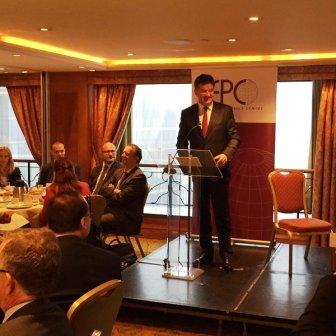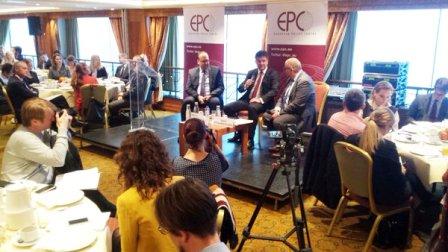On 1 June 2016 European Policy Centre (EPC) held a policy briefing on the priorities of the Slovak Presidency of the Council. At this Briefing, Minister of Foreign Affairs, Miroslav Lajčák, set out the priorities of the Slovak Presidency of the Council and addressed the key challenges ahead. After his presentation, the Minister was joined on the podium for the Q&A session by Slovakia’s Permanent Representative to the EU, Peter Javorčík.
On 1 July – for the first time since its accession to the EU in 2004 – Slovakia will assume the rotating presidency of the Council of Ministers (SK PRES). Slovakia’s tenure at the helm of the Council will be the EU’s 116th rotating presidency. The Slovak Republic will preside over the Council of the European Union at a time when the European Union is facing a number of challenges – migration, terrorism, hotbeds of tension in its neighbourhood, repercussions of the Eurozone crisis and a referendum on the United Kingdom’s membership of the European Union. It will take over the presidency at a difficult period in European integration characterized by multiple crises, political fragmentation and a lack of trust between EU Member States.

Minister Lajčák outlined the ambitions and priorities of the Slovak Presidency, a Presidency which constitutes a huge opportunity, great honour and culmination of Slovakia’s EU journey. One of his greatest concerns is the crisis of the political fragmentation the EU. Slovak Presidency will try to approach the challenges from a positive angle, considering always that failure is not an option in order to achieve pragmatic and tangible results. To overcome the fragmentation and restore EU citizens’ trust, we need a united Europe.
Minister further presented the 4 priorities/ambitions areas of the Slovak Presidency namely:
• Economic growth
• Strengthening the EU economy and Single Market – Digital Single Market and Energy Union
• Sustainable migration and asylum policy
• External relations – Trade deals and enlargement
According to Minister Lajčák, the Slovak Presidency will deal first and foremost with the financial-economic field as the talks on the EU’s budget for next year await the presiding country, the revision of the multi-annual financial framework for 2014-2020, while attention will also be paid to deepening the economic and monetary union. In line with that, the other ambition will be the deepening of the EU’s internal market and Single Market enriched by a Digital Single Market, and the creation of the Energy Union (with a forward-looking climate policy). As Presidency, Slovakia will further continue the deepening of the Economic and Monetary Union that will help increase competitiveness. Negotiations about the Union’s budget for 2017 and the building of the Capital Markets Union through key legislative initiatives will also feature high on the economic agenda. When it comes to building the digital market, Slovakia will prioritise the elimination of barriers to digital economy, the facilitation of the use of electronic services, access to the market and e-commerce, the availability of electronic content, as well as a high level of consumer protection.

In the area of migration, the Slovak Presidency will aim, first and foremost, at the implementation of the EU external border protection policy and the integrity and proper function of the Schengen Area. The Presidency is planning to prioritise positive agenda such as the Smart Borders package, which seeks to contribute to the fight against irregular migration and speed up passenger processing times through the use of modern technologies. In addition to this, it will come out with 7 proposals on legal migration aiming to make the EU more attractive for highly qualified migrants. He pointed out that Slovakia does not want to be a crisis manager, but to propose solutions. On the Schengen accession, the Minister said that he would be pleased if the Slovak Presidency would bring Romania and Bulgaria to Schengen.
On the aspect of external relations challenges the EU is facing, the Minister referred to the trade relations and TTIP by emphasizing that free trade can contribute to stability, growth and prosperity, however we must safeguard the EU standards in TTIP negotiations. He added that TTIP is ambitious, and therefore the Slovak Presidency will be open and transparent informing always the citizens.
Slovakia is a vocal advocate of the European Neighbourhood Policy (ENP) aiming to build on common interests and on values — democracy, the rule of law, respect for human rights, and social cohesion. As the EU’s enlargement policy represents the most effective instrument of positive change in this regard, Slovakia will seek to maintain the momentum and credibility of this process promoting comprehensive reforms and the transformative acquis tools to the candidate and potential candidate countries. He underlined that enlargement is key in stabilizing our neighbourhood, and the Slovak Presidency will, furthermore, pay particular attention to the accession processes of candidate and potential candidate countries and to the approximation of the Western Balkans to the EU. In that respect, Minister Lajčák stated that there are plans of opening chapters 23 and 24 of Serbia’s EU accession process, during the Slovak Presidency.
On the whole, Slovak Presidency aims at a United Kingdom within the EU (hoping to a public confirmation of EU model), a Schengen Area strong from the outside and free from doubt inside, regulated flows of migrants and a working Eurozone with efficient anti-crisis tools.
Minister Lajčák concluded by stating that as holder of the presidency, Slovakia stands ready to be a constructive broker, credible player, visionary manager and unbiased and fair mediator, working to the benefit of the entire EU. Whilst it is not always easy to cooperate and reach compromises, they are looking to address all pressing challenges in a manner that maintains cohesion in the European Union and reaffirms its fundamental principles and successful projects benefiting everyday life. None of the Member States can cope with the current crisis at a national level. The magnitude and nature of today’s problems requires common European response and sense.
